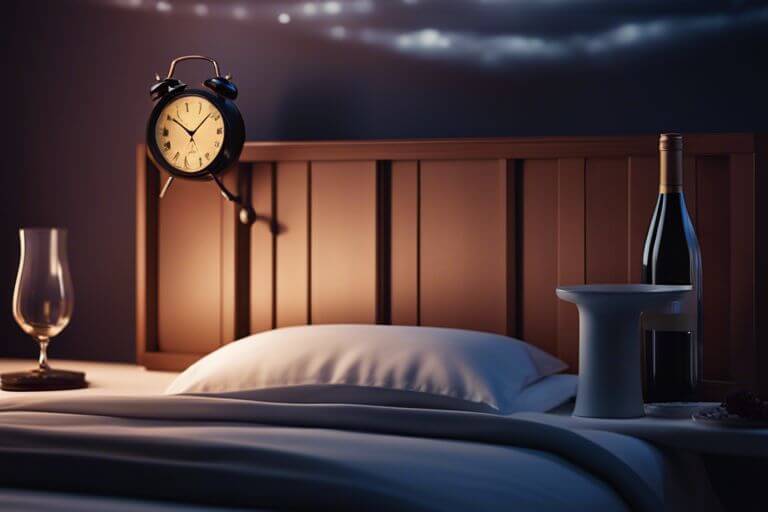Alcohol and Sleep – Debunking the Nightcap Myth
Alcohol has long been considered a remedy for promoting sleep, with many people turning to a nightcap to help them relax and unwind before bed. However, the truth behind alcohol’s effects on sleep is far from what many believe. Contrary to popular belief, consuming alcohol before bedtime can actually disrupt your natural sleep cycle, leading to fragmented and poor-quality sleep. In this post, we will explore the impact of alcohol on sleep and debunk the myth of the nightcap as a sleep aid.
Understanding Sleep
While many believe that a nightcap can improve their sleep, the relationship between alcohol and sleep is complex and often misunderstood. To debunk the nightcap myth, it’s necessary to examine into the science behind sleep and understand the factors that influence our nightly rest.
The Science of Sleep: Stages and Quality
Science has identified various stages of sleep that are crucial for restorative rest. The rapid eye movement (REM) stage is where most dreaming occurs and plays a vital role in memory consolidation and emotional processing. Non-REM sleep is divided into three stages, each necessary for different aspects of physical and mental restoration. Quality sleep involves cycling through these stages multiple times, with uninterrupted rest yielding the most benefits.
Factors That Influence Sleep
The environment we sleep in, our daily habits, and our overall health can significantly impact the quality of our sleep. Stress, diet, exercise, and screen time are just a few factors that can either promote or hinder a good night’s rest. Any disruption to our natural sleep-wake cycle or unhealthy habits can lead to sleep disturbances and impact overall well-being.
The key to a restful night lies in understanding how our lifestyle choices and habits influence our sleep quality. By prioritizing healthy sleep hygiene practices and creating a conducive sleep environment, we can optimize our nightly rest for improved physical and mental well-being. Any neglect of these factors can have detrimental effects on our overall health and daily functioning.
Alcohol’s Effects on the Body
Immediate Physiological Effects of Alcohol Consumption
If you’re considering a nightcap to help you sleep, think again. Any amount of alcohol can disrupt your sleep cycle, leading to fragmented sleep, decreased REM sleep, and even more frequent awakenings throughout the night. Additionally, alcohol is a diuretic, meaning it can increase your need to get up and use the bathroom during the night, further disrupting your sleep pattern.
Long-term Health Implications of Alcohol Use
Effects of long-term alcohol consumption on the body are significant and can be detrimental. Chronic alcohol use can lead to liver disease, heart problems, weakened immune system, and increased risk of certain cancers. It can also contribute to mental health issues such as depression and anxiety, and impact cognitive function over time.
Immediate effects of alcohol consumption, such as impaired coordination, slowed reaction times, and increased risk of accidents, are dangerous and can have serious consequences. Regular alcohol consumption can also lead to addiction and tolerance, requiring individuals to consume more alcohol to achieve the same effects, which can ultimately lead to alcohol dependence.
Alcohol and Its Impact on Sleep
Debunking the Myth: How Alcohol Disturbs Sleep Patterns
After a night of drinking, many people believe that a nightcap helps them fall asleep faster and sleep more soundly. However, the reality is quite the opposite. Alcohol actually disrupts the normal sleep cycle, interfering with both the quality and quantity of restful sleep.
The Consequences of Alcohol-Induced Sleep Disruption
On top of affecting the duration and quality of sleep, alcohol-induced sleep disruption can have detrimental effects on overall health and well-being. It can lead to increased daytime drowsiness, impaired cognitive function, and a weakened immune system.
Understanding the negative impacts of alcohol on sleep is crucial for maintaining proper rest and overall health. By avoiding alcohol as a sleep aid, individuals can promote better sleep hygiene and establish healthier bedtime routines.
Alternatives to the Nightcap
Natural Remedies for Improved Sleep
Keep the nightcap off the table and opt for natural remedies to enhance your sleep instead. Lavender imperative oil has been shown to promote relaxation and improve sleep quality when diffused in your bedroom before bedtime. Additionally, valerian root and chamomile tea are known for their calming properties that can help you drift off into a restful slumber.
Lifestyle Changes for Better Sleep Hygiene
Instead of relying on a nightcap, prioritize lifestyle changes to establish better sleep hygiene. Create a consistent bedtime routine and environment that is conducive to sleep, including a dark, cool, and quiet room. Avoid screens such as phones or computers at least an hour before bed to prevent disruption of your natural sleep-wake cycle.
This emphasizes the importance of maintaining a regular sleep schedule and incorporating relaxation techniques like meditation before bedtime to signal to your body that it’s time to unwind. By making these lifestyle changes, you can improve your overall sleep quality and reduce the need for a nightcap to fall asleep.
Summing up
With this in mind, it is clear that the idea of using alcohol as a nightcap to help with sleep is a myth. While alcohol may initially make you feel drowsy, it disrupts your sleep cycle and can lead to poorer quality sleep overall. It’s important to understand the impacts of alcohol on sleep and to seek healthier alternatives for promoting good sleep hygiene. By prioritizing good sleep habits and avoiding alcohol close to bedtime, you can improve your overall quality of sleep and wake up feeling more refreshed and well-rested. Note, a nightcap may seem like a tempting solution, but it’s ultimately counterproductive when it comes to getting the restful and rejuvenating sleep your body needs.

